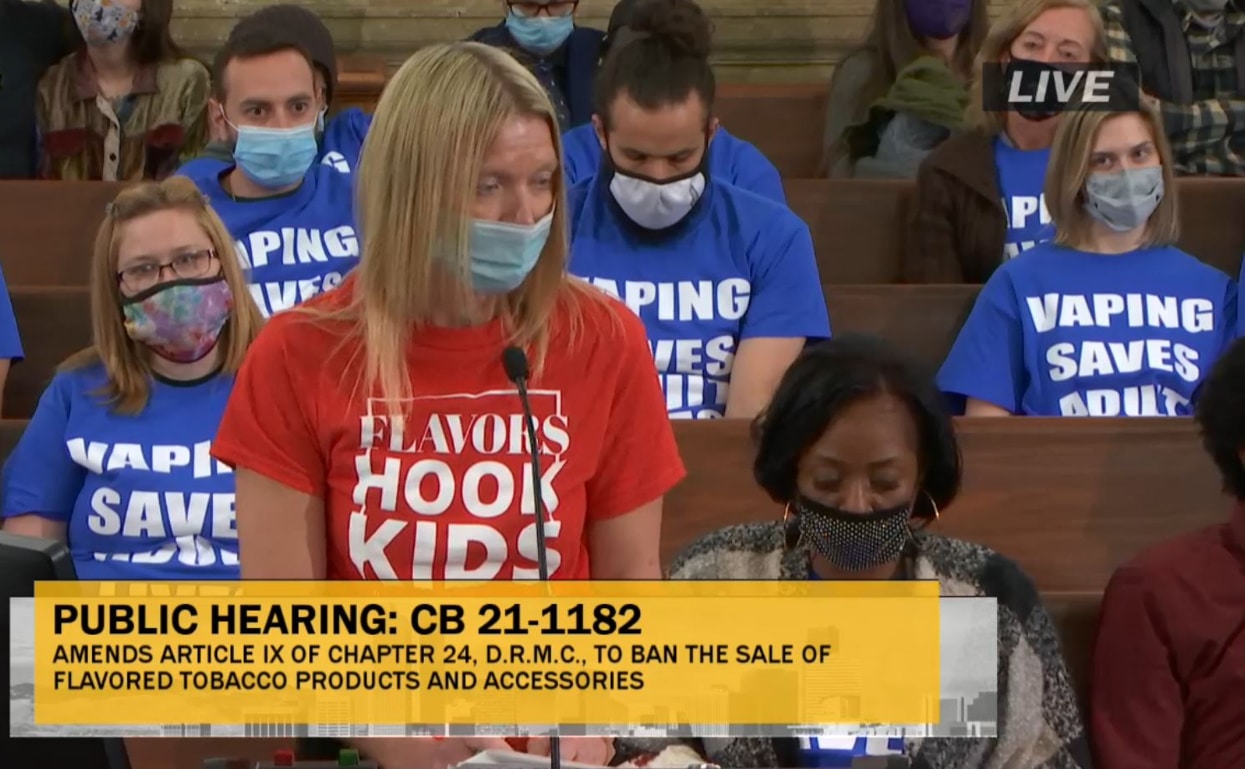[Update, December 12: A few days after the publication of this report, Denver Mayor Michael Hancock used his power of veto to block the ban. “I believe in passing and implementing effective policies,” Hancock told the Denver Post. “I didn’t see that this bill singling Denver out would do anything to keep nicotine and vaping products from our young people.”]
On December 6, the Denver City Council voted in favor of a ban on sales of flavored “tobacco products”—including flavored e-liquids and vaping products. The ordinance, which has been vehemently opposed by the vaping community and local small business owners at a series of fiery hearings, will take effect on July 1, 2023.
The decision is a major policy victory for co-sponsors Councillors Amanda Sawyer and Deborah Ortega. Anti-vaping organizations, including the Campaign for Tobacco-Free Kids, Parents Against Vaping E-cigarettes and Flavors Hook Kids, lobbied hard for the ban.
The ordinance passed by eight votes to three. At the meeting, Councillor Robin Kniech said of the ban, which she supported, “this is not prohibition.” She added, “I agree that prohibition is not an effective strategy,” while voting to restrict access to harm reduction products.
Kniech asserted that “there are still multiple chemical products in vaping products and we did have vaping-related illnesses prior to this pandemic.”
Research has shown that the so-called “EVALI” outbreak in 2019 was due to vitamin E acetate in illicitly manufactured THC products, not to nicotine vapes. Nicotine vaping is proven to carry vastly fewer risks than smoking, making it a huge health win for people who switch. Additionally, most people who make the switch prefer non-tobacco flavors.
Several amendments to the ordinance were proposed. One approved amendment—to not ban premium cigars or hookah and pipe tobacco, led by Councillors Jolon Clark and Paul Kashmann—means, among other things, that hookah lounges will be allowed to stay open.
Two other amendments, from Councillors Kevin Flynn and Kendra Black, were denied. These amendments proposed an exemption for menthol cigarettes—the prohibition of which is deeply controversial for reasons including racial equity concerns—and an exemption for specialty vape shops and tobacco stores affected by the flavor ban.
“We’re telling responsible adults 21-plus that they aren’t responsible enough to use flavored tobacco,” Councillor Black told Filter in an email, “but they can buy a pack of Marlboros, marijuana and alcohol?”
At the meeting, Black, who voted against the ordinance, had expressed other concerns. “It will not prevent kids from getting vaping products, but it will shut these businesses down,” she said. “They have leases, they have employees, they have bills, and they are willing to come to the table to work with us to address the real problem, so I encourage people to vote no.”
“Adults use flavored vape products to quit smoking cigarettes. I had the choice as an adult to use a flavored vape product and I like flavored vapes.”
“It is concerning when folks can go to Aurora or Commerce city and buy products,” said Councillor Stacie Gilmore, who also voted against the ban. “What’s to stop them from bringing them back into Denver and selling them at a park?”
“I would prefer us to look at a regulatory path,” Gilmore continued. “We’ve successfully, in Denver, regulated marijuana and alcohol, and we want to keep kids safe but we also want to allow adults to be adults.”
“We can do better for our kids. This ban doesn’t fix that,” said Phil Guerin, a father, vaper and local business owner, at an earlier hearing on November 29. “Adults use flavored vape products to quit smoking cigarettes. I had the choice as an adult to use a flavored vape product and I like flavored vapes.”
“The police have choked people to death for selling loosies, loose cigarettes,” he continued. “If you think loosies are a problem, imagine the problem on the street with vapes. … We’re the ones that make sure that kids don’t have these products. Bans don’t work.”
“Out of all the places where these bans have passed, there are no provisions that do anything for the users,” added drug policy consultant Art Way at that earlier hearing. “It’s all about how we can punish the sellers. In this case, the sellers that you’re punishing are the mom-and-pop tobacco harm reductionists that are based in Denver. You’re not punishing Big Tobacco with these bans.”
E-cigarettes and the flavors that most ex-smokers prefer represent a breakthrough in smoking cessation, and are significantly more effective as cessation tools than traditional nicotine replacement therapy options, like patches and gums. The campaign against them—based largely on stoked-up concerns over youth use, which is overwhelmingly not daily use and has been declining steeply—is an egregious example of drug-war fear-mongering. Prohibition, as we should know by now, creates many harms. Sadly, Denver’s ban is likely to encourage an illicit market, increase criminalization and deter people from quitting the cigarettes that cost so many lives.
Screenshot of one of the hearings leading up to the vote via Denver City Council





Show Comments